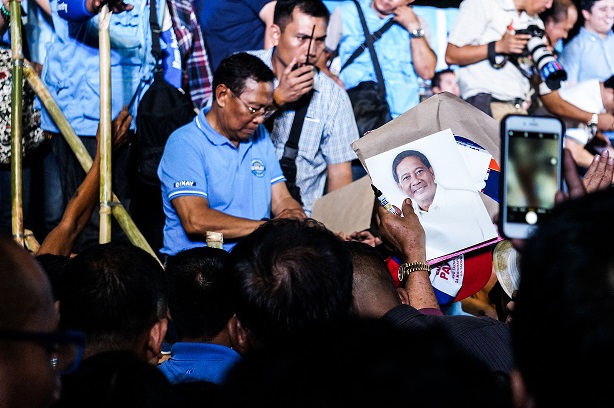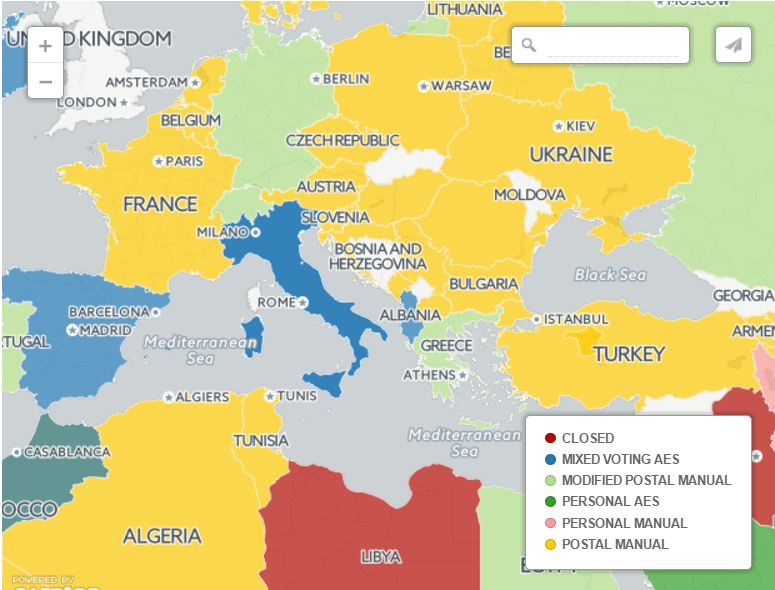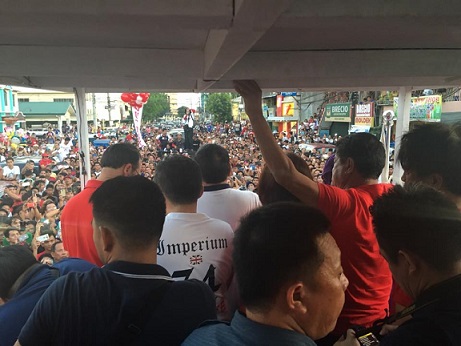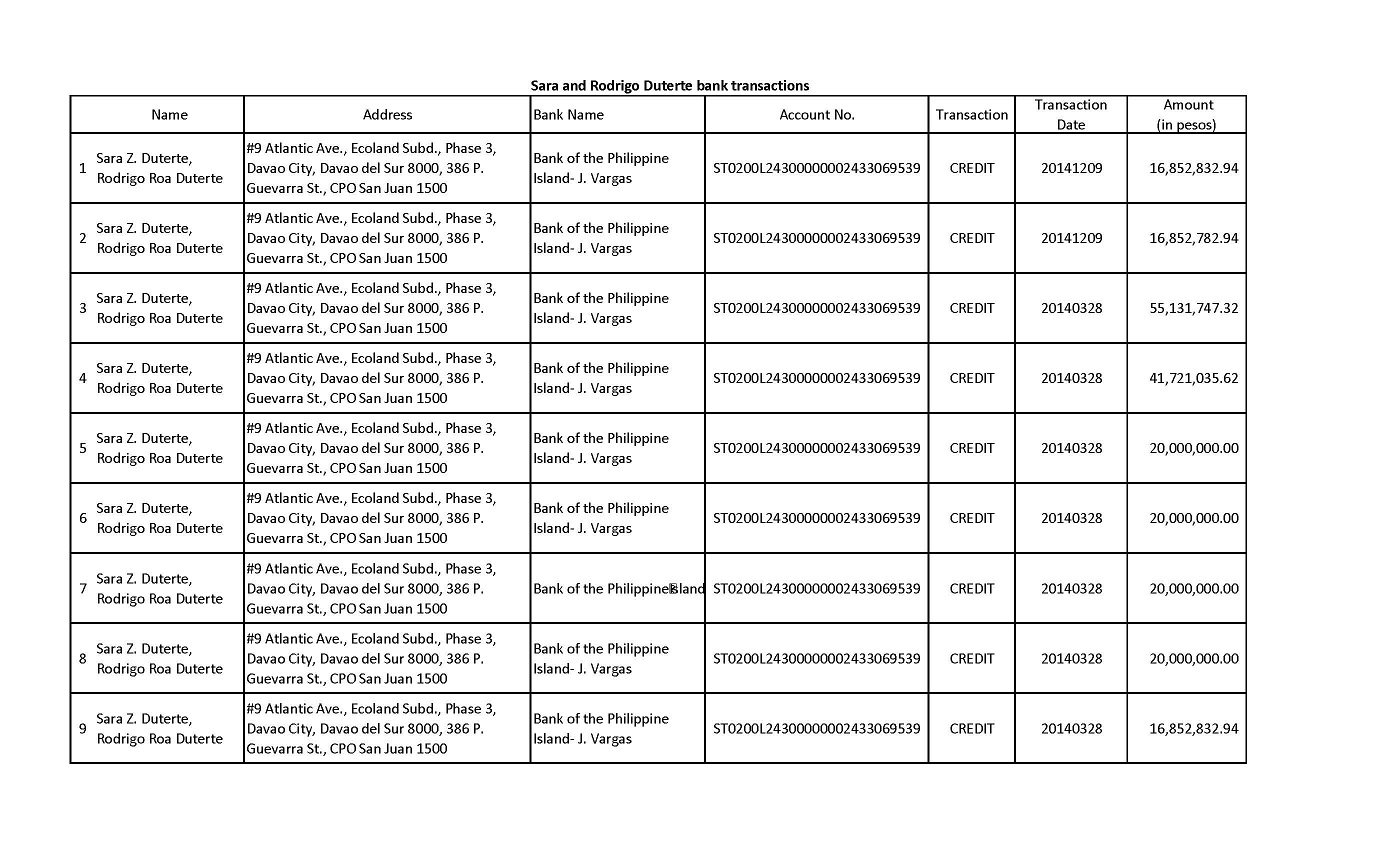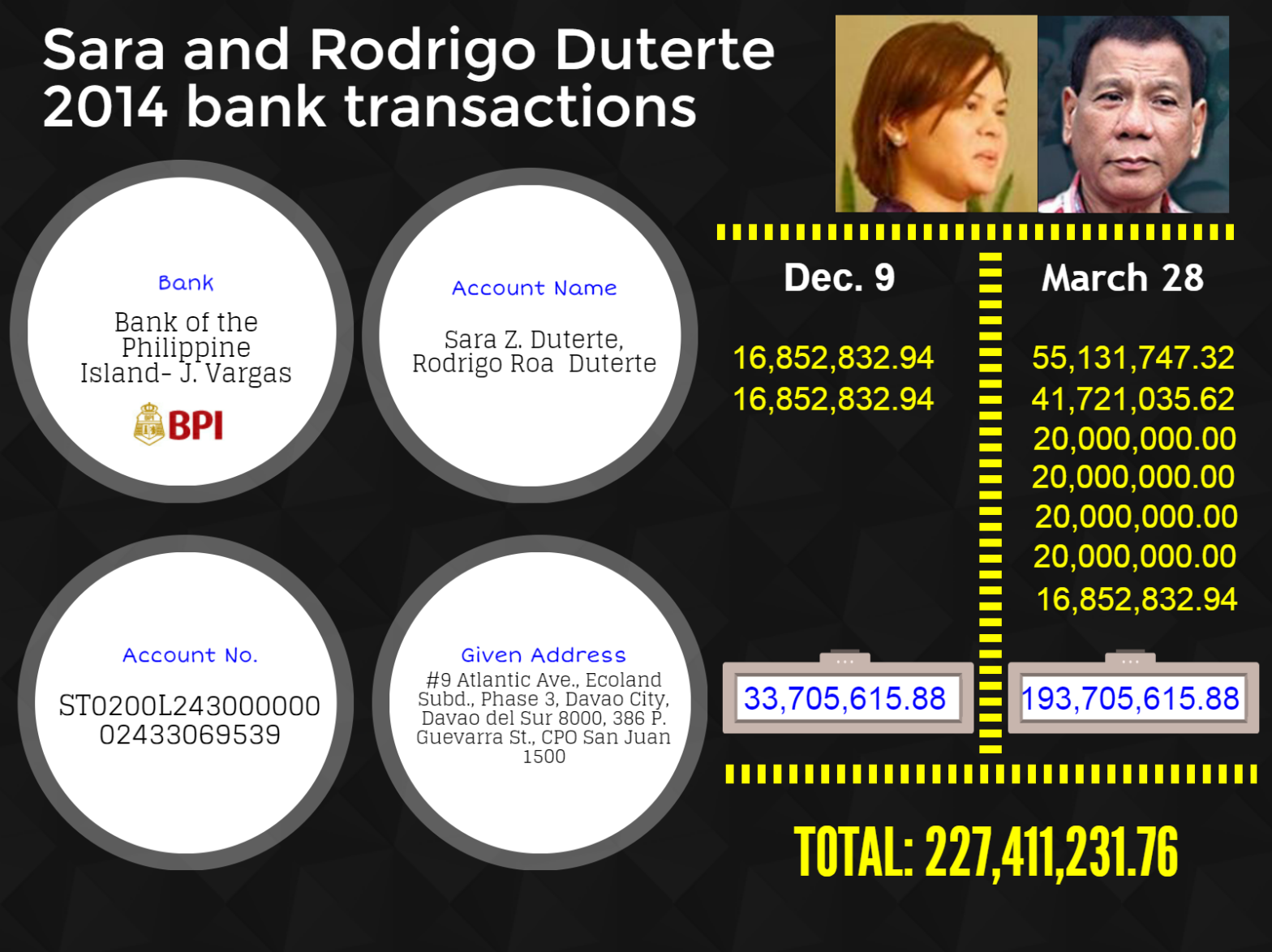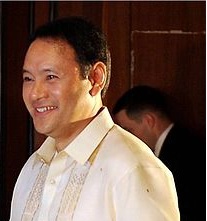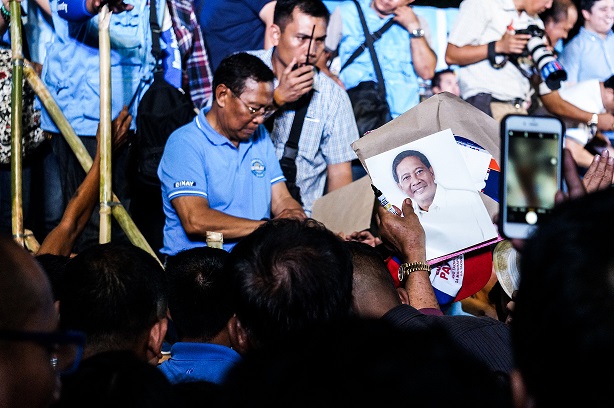
FOURTEEN days before the May 9 polls, former presidential bet frontrunner Jejomar Binay suffered his biggest setback.
The United Nationalist Alliance’s (UNA) standard-bearer plunged to fourth place in the latest Social Weather Stations (SWS) poll survey. He posted a rating of 14 percent – six points lower than his previous results. A far cry from the 35 percent that he posted way back in March 2015 even at the height of the investigation on the alleged anomalies in the Makati city government.
Drop in surveys, it seems, is not the only challenge Binay camp has to overcome.
Recently, the Garcias of Cebu withdrew their support to the vice president accusing him of “not appreciating and reciprocating their loyalty.”
The province of Cebu is one of the Philippines’ vote rich provinces with 3.2 million registered voters. Binay lost to Roxas in Cebu in the 2010 polls. His camp hopes to improve Binay votes in the coming elections.
The Garcias have expressed to support Duterte after accusing Binay’s camp of cavorting with their local opponents. The incident put into question UNA’s loyalty and respect to the Cebu-based political clan.
While the Garcias question Binay’s loyalty, it can be recalled that loyalty and friendship were the reasons he decided to postpone his bid for presidency in 2010.
Waived 2010 plans for Aquino
Banking on his track record as Makati’s hands on mayor, and holding executive posts in various government agencies, Binay had expressed his interest in running for the 2010 elections as early as 2008.
Binay slid to vice presidential race after then senator Benigno Simeon Aquino III decided to run for president. When Aquino picked Mar Roxas as his running mate, Binay decided to troupe with former president Joseph Estrada.
Considered as a dark horse during the early stage of the vice presidential race, Binay surprised everyone by defeating Roxas with less than one million votes.
Aside from him, two of his children were elected to government posts in Makati that year. His only son Jejomar Erwin “Junjun” Binay, was elected mayor while Mar-len Abigail “Abby” Binay won her second term as second district representative. In 2013, his eldest daughter Maria Lourdes Nancy Binay secured a seat in the Senate.
One day after the 2010 elections, Binay announced his plans to run as president in this year’s polls.
Binay’s term as vice president could have been perfect preparation in his bid for presidency this year.
From the Philippine National Bank (PNB) building on Macapagal Boulevard, Binay moved the vice president’s office at the Coconut Palace – the controversial P37 million worth project of former first lady Imelda Marcos.
The office of the vice president boosted that the move to Coconut Palace can cut half of its P800,000 monthly rental cost at the PNB building.
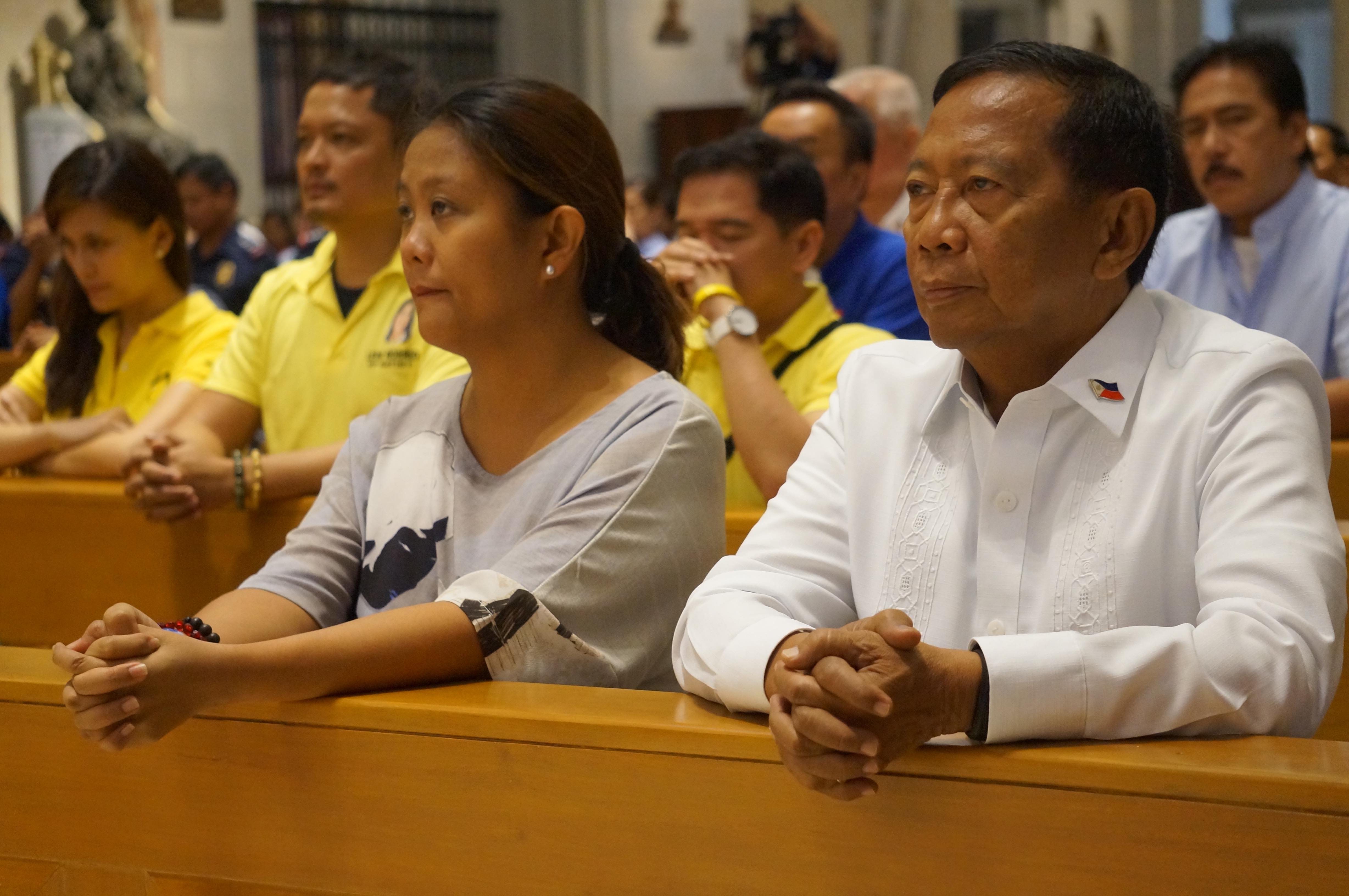
DILG post
Binay expressed his interest to lead the Department of Interior and Local Government (DILG) in the Aquino administration. The position was first given to the late Secretary Jesse Robredo. Roxas took over after Robredo died in a plane crash.
Aquino, however, appointed Binay as the chair of the Housing and Urban Development Coordination Council (HUDCC). As the housing czar, he led key agencies such as the National Housing Agency (NHA), Home Guarantee Corp, and Home Development Mutual Fund or Pag-IBIG Fund.
Aside from heading the HUDCC, Binay served as presidential adviser on overseas Filipino workers (OFW) and chair emeritus of the Inter-Agency Council Against Trafficking (IACAT).
The first half of his term as vice president was smooth flowing. Binay was part of the Aquino’s high-profile antitrafficking advocacy, which received nods from the international community. He also facilitated the repatriation of thousands of overstaying OFWs in Saudi Arabia and those who were trapped in conflict stricken parts of the Middle East.
Binay also took charge of monitoring and assisting OFWs facing cases abroad, including those who were in the death row.
As the housing czar, the office of the vice president boosts having provided direct housing assistance to more than half a million low-income and informal settlers families.
Binay camp also highlighted that it was during his term that Pag-IBIG’s assets reached more than P376 billion. The agency, according to his office, also became “one of the most profitable government corporations in the country with housing loan collection hitting P2.7 billion – all without increasing its monthly contribution, which remains at P100 since the 1980s.”
In a media interview, President Aquino said Binay did his job as the housing czar.
Senate investigation
In mid- 2014, however, Binay’s smooth sailing journey to the presidency was interrupted by series of corruption and plunder allegations.
In August 2014, the Senate blue ribbon committee started hearings on the alleged overpriced projects and services in Makati during Binay’s term.
Former Makati vice mayor and Binay ally Ernesto Mercado revealed in one of the hearings that Binay earned 13 percent in kickbacks from the city’s projects. These kickbacks would go to Binay’s family funds, vice president’s own use, and for his campaign funds in 2010 elections.
The late senator Joker Arroyo would later call this investigation the longest in the history of Senate blue ribbon committee hearings. Arroyo told the Senate to end the hearings and revisit the rules, as these have led to minimal results.
Binay is not new to situations like this. In 2006 a 60-day preventive order was issued against him and Mercado for allegedly padding the city’s payroll with “ghost employees.”
The Makati mayor’s camp branded this as political harassment. At the time, Binay had been in the forefront of protest against then president Gloria Macapagal Arroyo. Political allies, including the late president Corazon Aquino and former vice president Teofisto Guingona, showed up in Makati City hall to support Binay.
A temporary restraining order from Court of Appeals prevented the implementation of the suspension order. The turn of events boosted Binay’s image as the oppressed oppositionist.
Despite corruption issues he continued to top presidential surveys. Although there were periods when he lagged behind Poe or Duterte, Binay would always regain his lead in the next survey.
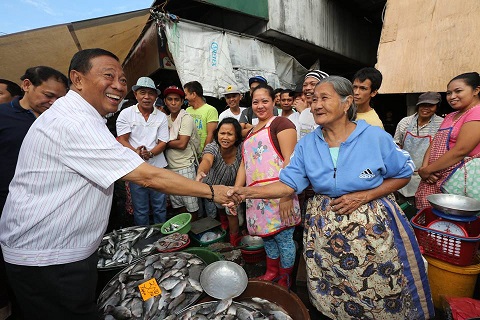
A poor boy’s rise to prominence
Binay’s resiliency in the political arena seems to reflect his childhood story.
Orphaned at a young age, Binay’s life changed radically. He worked hard to earn a bachelor’s degree in political science and Bachelor of Laws from the University of the Philippines.
He then passed the bar exam in 1968 and became a human rights lawyer and activist during the martial rule. Binay joined the Free Legal Assistance Group and helped found the Movement of Attorneys for Brotherhood, Integrity and Nationalism Inc. (Mabini). As human rights lawyer, he worked with future Aquino Cabinet members like Joker Arroyo, Augusto Sanchez, Fulgencio Factoran and Rene Saguisag.
After the ouster of dictator Ferdinand Marcos in February 1986, then president Corazon Aquino appointed Binay as officer-in-charge of Makati. This post paved way to Binay’s grip of the country’s financial district. He served as mayor until his three consecutive three-year terms provided by the Constitution for congressmen and elective local officials ended in 1998.
His wife, Dr. Elenita Binay, warmed his seat in 1998, while he served as chairman of the Metro Manila Development Authority (MMDA) and other government agencies under the Estrada administration.
Binay was elected mayor again in 2001, and reelected in 2004 and 2007. The second time he reached the term limit.
Binay takes credit for the giant leap in revenues of Makati—from P270 million in 1986 to almost P11 billion in 2009.
The story of his childhood and how he rose to power become Binay’s way to connect to his audience during campaign sorties and interviews. He would boost Makati’s well-funded delivery of services and projects such as free education and hospitalization for residents, among others.
“Ganito kami sa Makati. Ganito rin sana sa buong bansa (This is how we are in Makati; this is how the whole country should be),” became his staple statement. Binay would then crack his “Nognog” narrative – short, dark skinned – a description of an ordinary Filipino to which he claimed to be one.
This stint, however, is marred by the questionable jump of his P2.53 million net worth in 1988 to P60.25 million in 2014. The office of the vice president said Binay’s increase in net worth was mainly due to his JCB farms, a piggery business in Batangas he started in 1994.
Binay filed libel suits against people who implicated him in corruption cases, including Mercado whom he once promised to turn over the Makati mayoralty to in 2010. But unlike his loyalty to Estrada and the Aquinos, Binay dropped Mercado for his son Junjun.
In the last three presidential debates, Binay evaded questions about corruption issues, dismissing them as mere black propaganda.
Since the first debate, Binay has never regained his hold in any of the presidential surveys.
